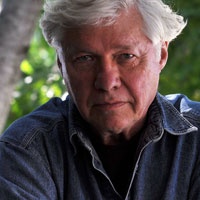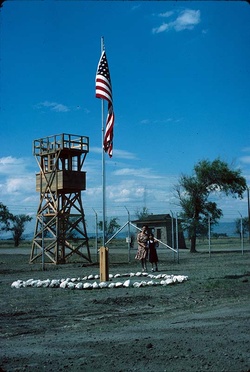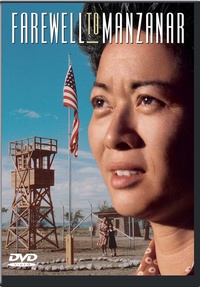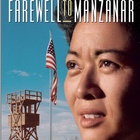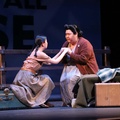“I was always out to change the world...”
John Korty’s remarkable success in the film industry—an Oscar and two Emmys among numerous film awards—doesn’t mean he’s “gone Hollywood.” The director of Farewell to Manzanar has consistently chosen projects focused on themes of social justice from very early in his career. Anti-war activism, racism, the civil rights movement, and adoption of special needs children are just some of the issues Korty’s examined in film.
Farewell to Manzanar, adapted from the novel by Jeanne Wakatsuki Houston and James Houston, tells the story of a Japanese American family incarcerated during World War II. That movie earned the Houstons and Korty a Humanitas Prize which is awarded annually to television programs that promote human dignity, freedom, and the commonality of the human experience. First broadcast by NBC in 1976, the film remains a timeless and effective vehicle for understanding a troubling chapter in American history.
In advance of the October 23rd screening of Farewell of Manzanar at the Japanese American National Museum, John Korty talked about his career, the film, and its legacy:
How did you get started as a filmmaker?
Well, I was very lucky in that I started very early. I saw the work of a Canadian animator named Norman McLaren when I was sixteen in art class, and I realized I could combine my artwork and my writing in a film career. At Antioch College, which had a work/study plan, I was able to start my own film company and still get a degree.
After graduating, my first documentary was for the American Friends Service Committee. It covered a peace vigil where a thousand Quakers came from all over the United States to stand in silence around the Pentagon for three days, in a vigil for peace. It was called The Language of Faces and was chosen for eleven different film festivals, winning the grand prize for documentary in the Bergamo Festival and also the grand prize in the San Francisco Film Festival as well.
In 1966, trying out dramatic narrative, I made my first feature film, The Crazy Quilt, on a tiny budget with unknown actors. Fortunately, it was an enormous hit—getting incredibly good reviews from major magazines and newspapers. We never made much money from it, but my name became known in the film world.
Why did you choose Farewell to Manzanar?
Hollywood was not on my radar when I became a filmmaker. In fact, I once swore to myself that I would never go there. I was out to change the world. I felt that film was the best way to have a social and political impact.
Years later, when I made The Autobiography of Miss Jane Pittman, the first night it was on the air, fifty million people watched it. The next day, the phone in my office rang all day long. I got phone calls from very famous people I had never met. They just called me up to say how much they liked it. But most important to me, the radio talk shows for three days were dominated by people calling in saying, “You know, before this film, I never knew what it was like to be a black person.”
Jim and Jeanne Houston saw Miss Jane Pittman and they came to me with their book. I felt it was a perfect project for me even though it was the wrong Career Choice because, in Hollywood, making films for television is kind of second-class citizenship compared to feature films for theatres. Most directors want to get out of that category.
My agents said, “You have all this leverage now. We can get you a film at Warner Brothers or Paramount or some place like that.” But I knew that if I didn’t direct Manzanar, it might never get done and the story of the camps would remain unknown to the American public.
How did the novel, Farewell to Manzanar, become a screenplay?
The Houstons provided the book and we were three co-equal writers on the screenplay. They would do a first draft of one section and I would do a first draft of another. Then we’d exchange drafts and allow each other to make comments, suggestions and revisions. So there was a lot of back and forth in the writing. Of course, it was really Jeanne’s experience, based on her memories.
Were you pressured to change the script?
In our first meeting with an NBC executive, he said, “it’s wonderful that you want to do this but I’m wondering—how do we involve the audience? Who is there in the film that the audience can identify with?” I just laughed out loud. I said, “Well, there’s a mother, a father, a grandfather, children. There are a lot of people they can identify with.”
And then he started to lay out his idea which was that the whole film should be told through the eyes of the white schoolteacher and that all the Japanese American characters should be in the background. We were just dumbfounded. We couldn’t believe what he was saying.
As it turned out, I said exactly the right thing. Instead of arguing with him, I said, “Well, that’s an interesting approach. Why don’t you write it up and send it to us and we’ll talk about it.” He never did it.
Luckily, we had an ally at Universal television, a wonderful guy named Frank Price. I called him up and said, “You won’t believe this, but the man at NBC wants the star of this movie to be a white person. That’s ridiculous.” He said, “You’re absolutely right.”
Was there opposition to having an almost all Japanese American cast and crew?
Once we were over the cast issue with Universal, the crew positions were more tricky because they involved professional experience. I insisted on Hiro Narita as the cameraman because he was someone I brought into the film business many years before.
I also interceded with the Director’s Guild to allow Richard Hashimoto to be my First Assistant Director even though he was not officially in that category yet. He has had a very successful career ever since.
I asked around about composers with Japanese American backgrounds and heard about Paul Chihara. When I proposed him to Universal, they said, “What are his film credits?” I said,”I think he did one low budget film, but he’s a very good composer, has done ballets and classical work.” “No, we have to have somebody with more film credits”. Finally I sort of Mau-Maued them, saying “Look, if we don’t have more Japanese names on this, we’re going to get a lot of opposition in their community.” Finally, they agreed and once Paul did that score, Universal loved him. They hired him for three or four more films and thought he was a great composer.
What do you think is the film’s legacy and why does it still resonate today?
Before the film was on the air, if you went out on the street in America and asked, “Do you know anything about what happened to the Japanese Americans during WWII?” probably eight out of ten people wouldn’t have known, or remembered, anything about the camps. This just was totally buried by the media and it was also, of course, buried by the older Japanese Americans. When I was casting, Jeanne sat in on early casting sessions. Young Japanese American actors would come in who were in their 20s and 30s and one of the first things they often said was that their parents were in a camp. Jeanne would ask, “What did they tell you about it?” They’d say, “Nothing.”
About ten or twelve years after the movie was on the air, the Reparations bill was passed. That was 1.6 billion dollars given back to Japanese Americans. I like to think that Manzanar being seen by twenty million people on television in 1976 helped to start the momentum that lead to the passage of that legislation.
Farewell to Manzanar resonates on a universal human level. Any well-made film that’s about people should affect everyone. It shouldn’t be limited. You can’t say a film about blacks would only affect black people. If it does that, it means it’s a very parochial film.
There’s so much of a human element in the Manzanar story that all kinds of people can identity with it.
Finally, how do you feel about the film finally being made available on DVD?
Very satisfied. I’ve been waiting for 30 years!
* * *
Farewell to Manzanar screening
Japanese American National Museum
Sunday, October 23, 2011 • 2pm
Join Director John Korty for a Q&A following the screening!
$25 Members; $30 non-members, includes admission and a complimentary copy of the DVD. Purchase tickets >>
Order the DVD from the Museum Store >>
© 2011 Japanese American National Museum


